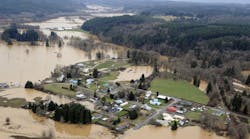Report Ranks U.S. Cities' Efforts to Save Energy
The American Council for an Energy-Efficient Economy (ACEEE) released the 2013 City Energy Efficiency Scorecard, a report that ranks 34 of the most populous U.S. cities on policies to advance energy efficiency. The report includes recommendations and strategies for all cities to lower energy use. ACEEE also launched a new interactive infographic accompanying the report that highlights each city's best practices and scores.
Boston took top honors, doing the most to save energy. Other top-scoring cities include Portland, Ore., New York City, San Francisco, Seattle and Austin, Texas. The next tier of top-scoring cities (Washington, D.C., Minneapolis, Chicago, Philadelphia and Denver) has also developed efficiency initiatives and are poised to rise in the rankings in future years.
The report is the first to rank cities exclusively on energy efficiency efforts. Cities are evaluated on what actions they are taking to reduce energy use in five key areas: buildings; transportation; energy and water utility efforts; local government operations; and community-wide initiatives.
Key findings:
- Local leadership and commitment to energy efficiency is strong. With great influence over energy use in their communities, city leaders can implement initiatives that provide benefits where they are most tangible to citizens and businesses, directly improving the community.
- Boston achieved the highest score overall, but other cities led in some policy areas. Portland scored highest in transportation and local government operations. Seattle ranked first in building policies. San Francisco tied with Boston for first in utility public benefits programs, and Austin is the city furthest ahead of its state on energy efficiency policy.
- All cities, even the highest scorers, have significant room for improvement. Boston, the highest scoring city, missed nearly a quarter of possible points. Only 11 cities scored more than half of the possible points. All cities can improve their efficiency initiatives to increase their scores, and several recommendations are offered in the report.
Key recommendations for cities:
- Lead by example by improving efficiency in local government operations and facilities.
- Adopt energy savings goals.
- Actively manage energy use, track and communicate progress toward goals, and enable access to data on energy usage.
- Adopt policies to improve efficiency in new and existing buildings.
- Partner with energy and water utilities to promote and expand energy efficiency programs.
- Adopt policies and programs to lower transportation energy use through location-efficient development and improved access to additional travel mode choices.
To read the report, visit: http://aceee.org/local-policy/city-scorecard.
Source: The American Council for an Energy-Efficient Economy


